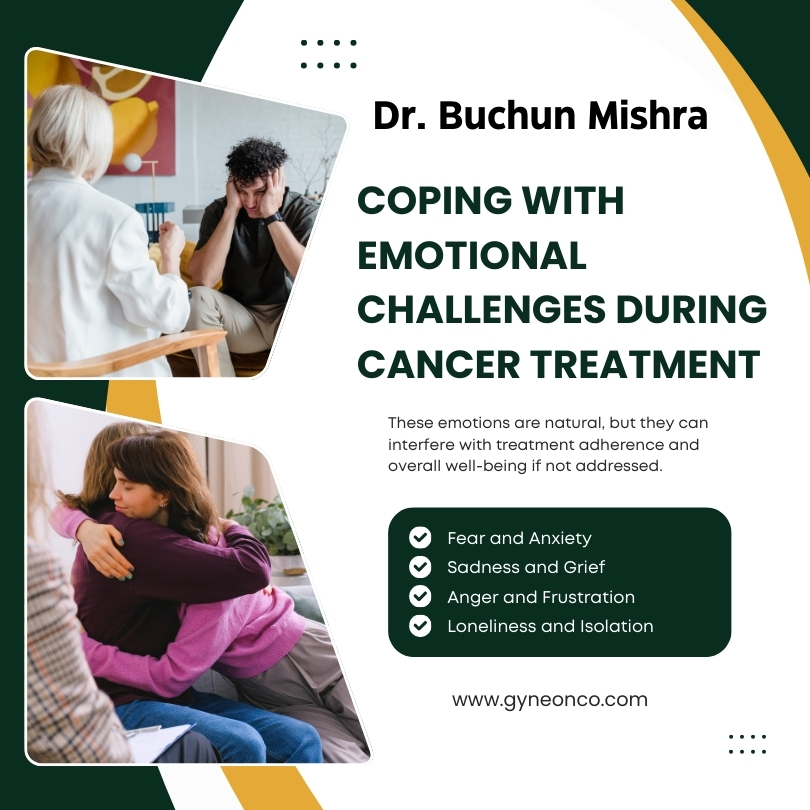
Coping with Emotional Challenges During Cancer Treatment
Post Date: 2025-01-18 11:58:56
A cancer diagnosis is life-changing, not only physically but emotionally. The journey through cancer treatment can be fraught with stress, fear, anxiety, and even depression. For women battling gynecologic cancers, these challenges can feel overwhelming. Dr. Buchun Mishra, a compassionate expert in gynecologic oncology at Medanta Medicity, Gurgaon, emphasizes the importance of addressing the emotional well-being of patients alongside their physical health. Here, we explore practical strategies for coping with the emotional toll of cancer treatment.
Understanding the Emotional Impact
Cancer treatment often comes with a rollercoaster of emotions. Common feelings include:
· Fear and Anxiety: Concerns about the outcome, side effects, and the future.
· Sadness and Grief: Mourning the loss of health, independence, or certain aspects of life.
· Anger and Frustration: Feeling powerless or frustrated by the disruption caused by treatment.
· Loneliness and Isolation: A sense of being misunderstood or distanced from loved ones.
These emotions are natural, but they can interfere with treatment adherence and overall well-being if not addressed.
Practical Strategies for Emotional Resilience
1.
Seek Professional Support
2.
o Therapists and Counselors: Speaking with a mental health professional can provide a safe space to process emotions and develop coping strategies.
o Support Groups: Joining a group of women undergoing similar challenges can foster understanding and reduce feelings of isolation.
3.
Build a Strong Support System
4.
o Rely on family, friends, or caregivers for emotional and practical support.
o Share your feelings openly with trusted individuals.
5.
Educate Yourself
6.
o Understanding your diagnosis and treatment plan can reduce fear of the unknown.
o Consult reliable sources or ask Dr. Buchun Mishra and his team for guidance.
7.
Practice Mindfulness and Relaxation Techniques
8.
o Meditation and Deep Breathing: Help reduce anxiety and improve focus.
o Yoga and Gentle Exercise: Promote relaxation and improve mood.
o Journaling: Writing about your experiences can be therapeutic.
9.
Prioritize Self-Care
10.
o Maintain a balanced diet to support physical and emotional health.
o Get adequate sleep and rest.
o Engage in activities that bring joy or relaxation, such as reading, listening to music, or crafting.
11.
Set Realistic Goals
12.
o Break tasks into manageable steps to avoid feeling overwhelmed.
o Celebrate small victories during treatment.
13.
Explore Spirituality
14.
o If spirituality is important to you, consider prayer, meditation, or connecting with a spiritual advisor.
Managing Emotional Challenges with Professional Help
Dr. Buchun Mishra highlights the importance of a multidisciplinary approach to cancer care. At Medanta Medicity, Gurgaon, patients have access to:
· Psycho-oncologists who specialize in the emotional aspects of cancer care.
· Social Workers who assist with navigating resources and building support networks.
· Complementary Therapies, including art therapy and music therapy, to ease emotional distress.
Supporting Loved Ones
Family members and caregivers also play a vital role in emotional recovery. They can:
· Offer consistent emotional support and encouragement.
· Attend appointments to provide companionship and understanding.
· Encourage open communication to ensure the patient feels heard and valued.
When to Seek Immediate Help
While emotional ups and downs are normal, some signs may indicate the need for professional intervention:
· Persistent feelings of sadness or hopelessness.
· Loss of interest in activities once enjoyed.
· Difficulty concentrating or making decisions.
· Thoughts of self-harm or harming others.
If these symptoms arise, seek immediate assistance from a mental health professional or a healthcare provider like Dr. Mishra.
Moving Forward with Strength
Coping with the emotional challenges of cancer treatment is an ongoing process, but with the right tools and support, it is possible to maintain a sense of hope and resilience. Dr. Buchun Mishra and the team at Medanta Medicity are dedicated to providing holistic care that addresses both physical and emotional needs, empowering women to face cancer treatment with confidence and strength.
Remember, you are not alone on this journey. Emotional healing is as important as physical recovery, and support is always available.
Comments